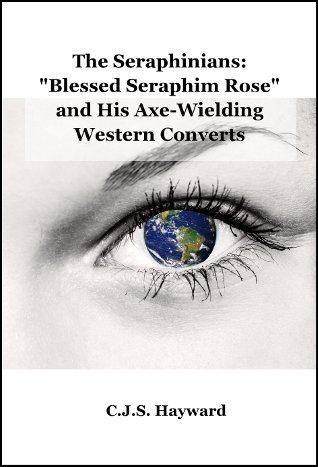The Amazon book description for The Seraphinians: "Blessed Seraphim Rose" and His Axe-Wielding Western Converts now says something significant in itself, now that I am reading originals like The Place of Blessed Augustine in the Orthodox Church. I quote the review:
About this book
This book is written primarily to document a large-scale behavior problem. It is also meant to provide a preliminary analysis of what is going on. The movement is Protestant converts to Orthodoxy who are still fundamentalists and rally under the banner of Fr. Seraphim.
In Fr. Seraphim's The Place of the Blessed Augustine in the Orthodox Church, Abbot Herman's preface reads:
FATHER SERAPHIM ROSE was by nature a warm-hearted man. Often he used to say, "It is noble to defend the underdog." He felt obliged to defend those who were considered by society to be somehow in the wrong. He believed that God was not necessarily on the side of those who are considered right, and that those who are dismissed and held in a negative light are in a position to be pitied. The latter, said Fr. Seraphim, are the ones whom Jesus Christ came to save; and therefore when he saw them being looked down upon, he took their side...
Our Lord Jesus Christ said: Judge not, that ye be not judged (Matt. 7:1). Psychologically, this means that in each act of judging another, the judge identifies the negative aspect in himself which he does not like, and thus projects it onto the other, thereby receiving gratification. He thinks that in this way he is getting rid of that negative aspect of himself, whereas in reality he is only breeding and nurturing it.
Our contemporary converts have a tendency to do likewise. They quickly [become] Orthodox, and then assume that by their conversion they have automatically become infallible. Thus they feel free to point out in others what in reality are their own faults, disguising this as righteous judgment. Instead of humbly seeing their own shortcomings, which are the outgrowth of preceding generations of Western apostasy, they often carry their Western legalism in the midst of the Orthodox Church, and as a result they deform the ancient Orthodox tradition and substitute it with modernism. In Russia this sickness has been identified by the term "renovationism." If the course of contemporary converts will continue in the renovationist style, making Orthodoxy fit into their own mentality rather than vice versa, then their understanding of Orthodoxy will end up as a kind of "anti-Western" legalism, or to put it another way, Western legalism in an Eastern Orthodox guise. As Fr. Seraphim saw, this very legalism lies at the core of the "Eastern Orthodox" attacks on Blessed Augustine, and he wanted to avoid it at all costs.
The opening quotes Fr. Seraphim as saying, "I myself fear the cold hearts of the 'intellectually correct' much more than any errors you might find in Augustine. I sense in these cold hearts a preparation for the work of Antichrist (whose imitation of Christ must also extend to correct theology); I feel in Augustine the love of Christ."
The more the author reads of Fr. Seraphim, the more wondering there is if Fr. Seraphim might be appalled by those who were under the banner of "Blessed Seraphim Rose." This book, when it was new, was an underdog position, and to date the author knows no disciple of Fr. Seraphim's legacy who has decided to defend this particular underdog, nor of any disciple who writes a review of this work in which this book is found to represent serious error but represent the work of an errant brother who is to be pitied but never hated. The author has refrained from praying, "Fr. Seraphim of Plantina, protect me from your followers!" but now wonders if Fr. Seraphim now stands before the throne of God and would welcome such prayers.
"Our contemporary converts have a tendency to do likewise. They quickly [become] Orthodox, and then assume that by their conversion they have automatically become infallible," reasonably describes many of this book's reviews, and the amount of poison to be found in them leaves the author to wonder if Fr. Seraphim would see him as an underdog.
Read the reviews if you like, then buy, read, and review the book.

